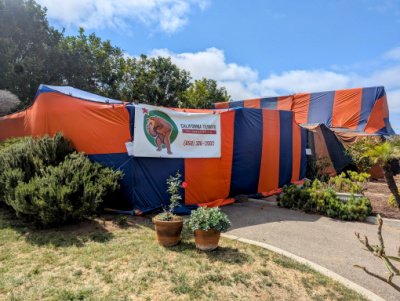Fumigation Gotchas: What Can Go Wrong (and How to Avoid It)
 Most people know that fumigating for termites means bagging food and vacating their home for a few days. But fewer people realize that certain overlooked details can lead to delays, added costs, or even cancellation of the fumigation altogether.
Most people know that fumigating for termites means bagging food and vacating their home for a few days. But fewer people realize that certain overlooked details can lead to delays, added costs, or even cancellation of the fumigation altogether.
Here are a few real-life examples from the field—and how California Termite helps prevent these common “gotchas.”
1. Improper Bagging
I recently oversaw a fumigation at an eleven-unit apartment building in Encinitas. I met with all the tenants the Friday before, providing instructions, special fumigation bags, and multiple rolls of masking tape. I explained that safes needed to be left open and pointed them to a video on our website that clearly shows what to bag and how.
I always try to be present when the tent is being set up—something that wasn’t possible when I worked for larger companies with packed inspection schedules. I’m glad I made it that day.
Out of eleven units, none of the tenants bagged correctly:
- No one used the masking tape.
- Few double-bagged.
- Some tied bags shut with zip ties (which isn’t allowed).
- Others left food in refrigerators that needed to be removed or bagged.
- A few even bagged items that didn’t need it.
I spent an hour fixing these mistakes while the workers raised the tent. At one point, I stepped out of a unit to find myself sealed inside the tent!
Had I not been there, the fumigator would have charged the landlord $50 per bag to fix the mistakes—adding up to over $1,000 in additional costs.
2. Locked Doors and Inaccessible Areas
Every room and enclosed area must be accessible during fumigation so the gas can spread evenly and the property can be fully cleared of occupants.
At the same Encinitas property, a row of cabinets in the garage had been padlocked shut. The tenants had already left, and no one had the keys or combinations. The fumigator had to cut every lock using bolt cutters—a tool they bring because this happens more often than you’d think.
If it had been a locked safe and no one had the combination, the fumigation would have been postponed. That would have meant eleven tenants—who had already bagged all their food and made temporary living arrangements—would have had to do it all over again.
It’s important to note: fumigators don’t make the rules. The County of San Diego’s Department of Agriculture, Weights and Measures does. Fumigators are required to submit their schedules in advance, and random audits by county reps do happen. If the paperwork isn’t right, a safe is locked, or food is improperly bagged, the county can stop the entire fumigation.
3. Lightning and Weather Delays
Weather can also get in the way. I once had a job scheduled for a large home with a steep, three-story tile roof. On the day the tent was to go up, a lightning storm rolled in. It wasn’t safe for the crew to be on the roof, and the fumigation had to be postponed.
Now, I always check the weather forecast before scheduling—but not every company does.
The Bottom Line: Experience Matters
These kinds of issues can easily lead to delays, added costs, or rescheduling—none of which you want to deal with after all the effort it takes to prepare for a fumigation.
At California Termite, we bring real-world experience to every job. We walk you through every step, provide clear instructions, and are present during critical moments to help avoid costly errors.
We also offer some of the most competitive fumigation pricing in the industry—we’ll beat any written quote.
Don’t let avoidable mistakes ruin your fumigation.
Call California Termite. We make the process smoother, safer, and more affordable.
John Gelhard


